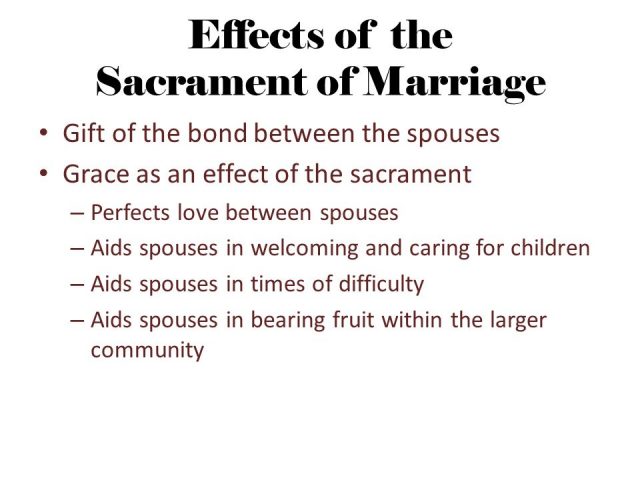By Henry V. Sattler, C.SS.R., CatholicCulture.org
DESCRIPTION
This article provides an explanation of the wonderful effects of the graces conferred by the Sacrament of Matrimony. “Not only does Matrimony make the married pair officially supernatural in action, but it provides them with the remedies against the wounds of personality caused by sin. The ‘cussedness of human nature’ left by original sin, the pettiness, the angers and tensions found in marriage have an inherent remedy in sacramental grace. Even the weaknesses incurred by personal sin, the hungers created by unchastity both in and out of marriage, the infidelities to parental obligation which leave marks of desire and parental sloth are met by the repentant husband or wife with special helps to overcome them.”
LARGER WORK Sanctity and Success in Marriage
PAGES 87 – 94
PUBLISHER & DATE National Catholic Conference on Family Life, 1956
Christ came on earth “that you may have life and have it more abundantly.” This life is Sanctifying Grace which is “that grace which confers on our souls a new life, that is, a sharing in the life of God Himself.”1 Sanctifying Grace is God’s very own way of living, of knowing, and of loving, in us. But it is not a kind of cloak placed around our souls, leaving the nature of the soul untouched; it is a reality in the soul which transforms it intrinsically, much as the electric light bulb is transformed by the surge of electricity in it. Sanctifying Grace is God’s life within us which makes not only our being supernatural, but also our power to act supernatural — divine. Grace gives us not only a static reality, but a dynamic one in that it furnishes the power to act — to “walk in newness of life.”
In order that we may share in this life, we must enter into the life, passion and death of Christ; and this is accomplished by the Sacraments, the channels of Sanctifying Grace instituted by Christ. “Do you not know,” says Saint Paul, “that all we who have been baptized into Jesus Christ, have been baptized into His death? . . . For if we have been united with Him in the likeness of His death, we shall be so in the likeness of His Resurrection also.”2
Christ possesses, in His human nature, the complete and perfect gift of Sanctifying Grace. As man, He was the “perfect connatural principle of all forces of supernatural activity.”3 This Sanctifying Grace in Christ “is called the gratia capitalis, because — existing perfectly in Christ — it is also the head and source of all our grace.”4
Now, the grace, or supernatural life, of Christ flows to man through the Sacraments, and the Sacraments “contain the grace which they signify.”5 Hence, each Sacrament gives a specific sort of Sanctifying Grace according to the end or object of the respective Sacraments.6 This Sanctifying Grace which is conferred specifically by each Sacrament in order to obtain a special effect is called sacramental grace.7To rephrase the doctrine, the grace, or supernatural life of Christ, our Head (gratia capitalis) is conferred upon the members of His Mystical Body in seven different ways, much as human life is communicated to each member of the body, enabling the different living organs to function differently according to their particular object. How this is meant may be seen in a decree of the Council of Florence:
For by baptism we are spiritually reborn; by confirmation we increase in grace and are strengthened in the faith; reborn and strengthened, we are nourished by the divine food of the Eucharist. But if through sin we should incur the sickness of the soul, we are spiritually healed by penance; but spiritually and bodily, as if fitting for the soul, through extreme unction; by Order the Church is spiritually governed and multiplied, by matrimony it is bodily increased.8
Pope Pius XII, in his encyclical on the Mystical Body, brings this doctrine up to date when he says that the Saviour of mankind instituted seven different Sacraments so that “by so many consecutive graduated graces” all the varied needs of His Mystical Body might be generously provided for.
Effects of Sacramental Grace
The question that now faces us is what are the proper effects of this sacramental grace? What precisely does it do? Sacramental grace, first, “makes the receiver of the sacramental grace a habitual connatural agent, so that he can place acts in keeping with the end of the sacrament at will and ex officio.”9 What does this mean? Take an example. Suppose I could talk through a dog as a ventriloquist. The action of the brute animal would not be changed. Suppose I could talk through that dog, using its voice. The dog would then be an instrument. Suppose I could raise the dog above its nature so that it could talk at will. The dog would then become a habitual agent of speaking, something not natural to it but made as though natural by my gift. Since there are many strictly human actions that might become supernatural to a dog — so there might be many different “graces” given to it. So in a similar fashion, but in an inexpressibly superior way, man is raised to perform different “divine” actions through the various sacramental graces. When a confirmed person, for example, bravely confesses Christ, or a priest consecrates at Mass, each one acts officially and as the agent of a special supernatural act. And that act flows from them “connaturally,” as the ordinary human act of speaking flows naturally from a human being. Tremendous thought, this! By sacramental grace, truly do actions flowing from divine life come from us effectively as our thinking, and loving come from our ordinary human nature!
Secondly, sacramental grace remedies in us the defects which remain in us from past sin, both original and personal (actual).10 Original sin has destroyed the integrity of the human person, has made it difficult for all the human powers to work together for good. Though original sin has been wiped out by Baptism, its effects will remain with us. This is true of our own personal sins. Even after they have been wiped out in the confessional and by Penance; indeed, even after a life of virtue, sin leaves in us marks or wounds, weaknesses, that remain. Sacramental grace acts as a remedy to those wounds as Saint Thomas says:
. . . Baptism corresponds to faith, and is ordained as a remedy against original sin; Extreme Unction to hope, being ordained against venial sin; the Eucharist to charity, being ordained against the penal effect which is malice; Order to prudence, being ordained against ignorance; Penance to justice, being ordained against concupiscence; Confirmation to fortitude, being ordained against infirmity.11
Thirdly, sacramental grace brings with it the right to those actual graces necessary to stimulate us to perform supernatural acts in accordance with our needs. If you remember, “actual grace is a supernatural help of God which enlightens our mind and strengthens our will to do good and to avoid evil.”12 Actual grace is a kind of needle which pushes us towards good and away from evil wherever needed to further the end of the respective Sacraments.13 This means that not only does sacramental grace officially constitute a person as supernatural action, not only does it bring remedies to the weakness incurred by sin, but it also gives to the receiver of a Sacrament a right (a right freely conferred by God) to actual pushes from God in the proper direction!
Sacramental Grace in Marriage
This lengthy theological discussion on the nature of sacramental grace is necessary if we are to draw any practical fruits from the awareness of the sacramental graces of matrimony.
The sacrament of marriage is the imprint of God on the souls of the married couple, not merely in order to deify their life in general, but in order to deify their union . . . The sacrament of marriage is thus not merely a religious act sanctifying a human one, it is a seed sown in the soul and bearing fruit through the whole of married life, giving life to all its acts and sentiments . . . it is a predisposition to holiness placed in their souls by God on the day of their wedding.
Man and wife are united in God: this last expression can be interpreted in a very strict sense, for the action of the sacrament being a unique divine action in the souls of each of them, and sacramental grace being a reality in their souls, one can truly state that they have something in their souls which really unites them, which constitutes a principle of unity, and that this unifying action is a divine action. The sacrament of marriage is thus in a sense a deifying of the conjugal union . . . 14
The sacramental grace of Matrimony then takes a Christian marriage out of the realm of the natural and makes the married couple connatural principles of supernatural action. In Casti Connubii Pius XI says, quoting the Council of Trent:
. . . By raising the Matrimony of His faithful to the dignity of a true sacrament, [Christ] made it a sign and source of that peculiar internal grace by which ‘it perfects natural love, confirms an indissoluble union, and sanctifies both man and wife.’
And in the same encyclical:
. . . As Saint Augustine teaches, just as by Baptism and Holy Orders a man is set aside and assisted either for the duties of Christian life or for the priestly office and is never deprived of their sacramental aid, almost in the same way (although not by a sacramental character) the faithful once joined by marriage ties can never be deprived of the help and binding force of the sacrament.
Not only does Matrimony make the married pair officially supernatural in action, but it provides them with the remedies against the wounds of personality caused by sin. The “cussedness of human nature” left by original sin, the pettiness, the angers and tensions found in marriage have an inherent remedy in sacramental grace. Even the weaknesses incurred by personal sin, the hungers created by unchastity both in and out of marriage, the infidelities to parental obligation which leave marks of desire and parental sloth are met by the repentant husband or wife with special helps to overcome them.
Thus if they should have been unfaithful to each other or to their duties, no matter for how long, through penance they can always have recourse to this inexhaustible source of sacramental grace, to find in it the means of regaining sanctification through renewed love and appreciation of the ideal to which they are called.15
Lastly, “the sacrament of marriage confers a strict right to all the actual graces necessary to lead a Christian conjugal life. It also confers the right to all the material and spiritual helps required for the establishment of a home.”16
Since actual grace “enlightens the mind and moves the will,” a married couple can expect God to inspire them to know what they should understand and do in a given case and to strengthen their will to carry it out. This means that in the questions asked by the couple of themselves, in the questions asked by the children, a married pair who stir up the grace of God in them can await with certainty the right answers. It means also when they feel inadequate to the task of the moment they can expect new courage to be available to them.
By these gifts the parties are assisted not only in understanding, but in knowing intimately, in adhering to firmly, in willing effectively, and in successfully putting into practice, those things which pertain to the marriage state, giving them in fine right to the actual assistance of grace, whensoever they need it for fulfilling the duties of their state. (Casti Connubii)
This, then is the meaning of sacramental grace in marriage. It is the special mode of Sanctifying Grace which makes the receiver a habitual connatural principle of supernatural action in Marriage — which means that the love, and love-making, and housekeeping and work and worry of marriage are all deified. Further, sacramental grace in marriage brings with it remedies for the weakness of human nature, even for those weaknesses suffered as a result of the infidelities of the married couple. Lastly, it brings a right to the stimulus of God toward knowing the right answers and acting according to them.
Cooperation with Grace
Why, then, with all the tremendous beauty and power of Matrimony’s sacramental grace, do so many Christian marriages fade so far from the ideal?
Because “fruitful reception of a sacrament does not conclude the Christian’s duty — it is still up to him to cooperate with the power the sacrament gives . . .”17
Pius XI notes very strongly: “Since men do not reap the full fruit of the sacraments . . . unless they cooperate with grace, the grace of matrimony will remain for the most part an unused talent hidden in the field unless both parties exercise these supernatural powers . . .”
Husbands and wives must carefully cooperate with sacramental grace by prayer, by frequenting the other Sacraments, by meditating on the nobility of their state, by constantly reminding themselves and each other to depend upon this supernatural reality in their lives. It is imperative, also, that they strive earnestly to preserve Sanctifying Grace within their souls, since sacramental grace is but a mode of Sanctifying Grace.
Another thing worth impressing on the faithful is the importance of conserving or regaining the state of grace, not only for its own sake, but also in order to be assured of sacramental grace. For, according to the more probable opinion, upheld by the majority of theologians, sacramental grace is contingent upon the possession of sanctifying grace.18
Yet, despite the need of preserving Sanctifying Grace, it should be a consoling thing to a married person to realize that, though grace may be lost when mortal sin is committed, it all returns, with all the special helps of sacramental grace, when Penance returns the Prodigal home.
Let me conclude this entire presentation with the stirring appeal of Pius XI to married people:
Let not, then, those who are joined in matrimony neglect the grace of the sacrament which is in them; for, in applying themselves to the careful observance, however laborious, of their duties they will find the power of that grace becoming more effectual as time goes on. And if ever they should feel themselves to be overburdened by the hardships of their condition of life, let them not lose courage, but rather let them regard in some measure as addressed to them that which Saint Paul the Apostle wrote to his beloved disciple Timothy regarding the sacrament of Holy Orders when the disciple was dejected through hardship and insults: ‘I admonish thee that thou stir up the grace which is in thee by the imposition of my hands. For God hath not given us the spirit of fear; but of power, and of love, and of sobriety.’
Notes
1 Baltimore Catechism No. 3. q. 110.
2 Romans 6:3-6.
3 Lawrence P. Everett, The Nature of Sacramental Grace, (Washington, D. C.: Catholic University of America Press, 1948), p. 111.
4 Ibid., (parenthetical remark introduced by writer of present article).
5 Conc. Trid. Sessio VII, can. 6, (DB-849).
6 The definitive nature of sacramental grace remains to be fashioned on the anvil of theological controversy. I have adopted the modal theory of sacramental grace, which seems to me the best. Since I do not pretend to be a theologian, I await, with others, a more definitive presentation of doctrine. Those interested in the various opinions may consult Everett, op. cit. and Shea, George W., “A Survey of the Theology of Sacramental Grace,” in Proceedings, Eighth Annual Convention Catholic Theological Society of America, 1953, N. Y., pp. 81-130.
7 St. Thomas, Summa Theologica III, q. 62, a. 2, c.
8 Conc. Flor., Decretum pro Armenia (DB 695).
9 Everett, op. cit. p. 118. John of Saint Thomas, Cursus Theologicus, IX, d. 24, a. 2, n. 13.
10 Saint Thomas, Comm. in Sent. IV, d. 7, q. 2, a. 2, q. 2, ad. 2., XXVII de Veritate, a. 5, ad. 12., Summa Theol. III, q 62, a 2, ad. 2.
11 St. Thomas, Summ. Theol. III q. 65, a 1, c. ef. Everett, op. cit. pp. 101, ff.
12 Baltimore Catechism No. 3, q. 113.
13 Shea, op. cit. pp. 119, ff.
14 Jacques Leclercq, Marriage A Great Sacrament, (Dublin; Clonmore & Reynolds, 1951), pp. 29-30.
15 M. M. Philipon, The Sacraments in the Christian Life, (Westminster; Newman Press, 1955), p. 220.
16 Ibid.
17 Shea, op. cit., p. 125.
18 Shea, op. cit., p. 126.
This item 6258 digitally provided courtesy of CatholicCulture.org
https://www.catholicculture.org/culture/library/view.cfm?recnum=6258







